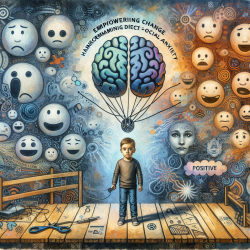As a practitioner dedicated to creating great outcomes for children, it's essential to stay informed about the latest research and its implications for your practice. One such insightful study is "Oral health related quality of life of children and adolescents affected by rare orofacial diseases: a questionnaire-based cohort study," which sheds light on the multifaceted challenges faced by children with rare orofacial diseases and provides valuable data to guide your therapeutic approaches.
Key Findings and Their Implications
The study, conducted in French centers for rare diseases, involved children aged 6 to 17 years and examined various factors affecting their oral health-related quality of life (OHRQoL). Here are some critical findings and their implications for your practice:
- Psychosocial Impact: Children, especially girls, reported feeling isolated and different from their peers, which significantly impacted their OHRQoL. Incorporating social skills training and peer interaction activities in your therapy sessions can help mitigate these feelings of isolation.
- Financial Barriers: Renouncement to dental care due to financial constraints was a significant factor in lower OHRQoL. Advocating for better financial support and guiding families to available resources can be a crucial part of your role.
- Syndromic Diseases: Children with syndromic diseases had worse OHRQoL. These children may require more intensive, multidisciplinary care plans that include psychological support alongside speech therapy.
- Oral Symptoms: Issues such as tooth shape and color problems were associated with lower OHRQoL. Addressing these concerns in your therapy sessions, possibly in collaboration with dental professionals, can improve outcomes.
Actionable Steps for Practitioners
Based on these findings, here are some actionable steps you can take to enhance your practice and support children with rare orofacial diseases:
- Holistic Assessment: Conduct comprehensive assessments that include psychosocial and financial factors, not just oral symptoms.
- Multidisciplinary Collaboration: Work closely with dentists, psychologists, and other healthcare providers to create integrated care plans.
- Family Support: Provide families with information on financial aid programs and support groups to help them navigate the complexities of care.
- Ongoing Education: Stay updated on the latest research and best practices to continually refine your therapeutic approaches.
To read the original research paper, please follow this link: Oral health related quality of life of children and adolescents affected by rare orofacial diseases: a questionnaire-based cohort study.










